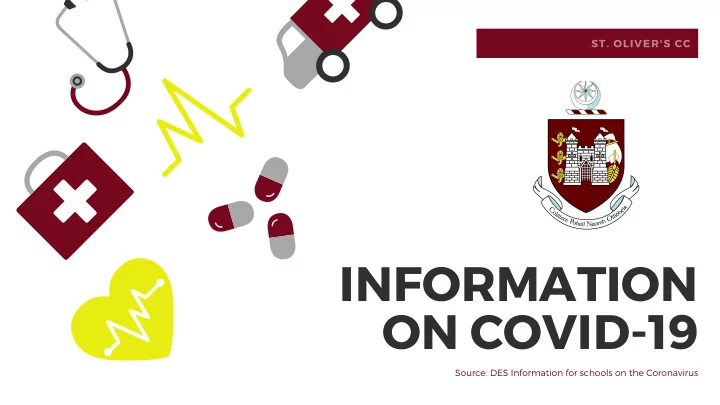

ST . OLIVER ' S CC INFORMATION ON COVID - 19 Source : DES Information for schools on the Coronavirus
Presentation Breakdown What is Coronavirus / Covid - 19 ? How is it spread ? What are the symptoms ? The risk of catching Coronavirus in Ireland . How can I protect myself from getting Covid - 19 . Four key steps to prevent the spread of Covid - 19 . Steps taken in SOCC Further information
What is coronavirus / Covid - 19 ? Coronaviruses are a large family of viruses that usually circulate among animals including camels , cats and bats . Coronaviruses can be transmitted ( spread ) from animals to humans . Coronaviruses cause illness in humans ranging from the common cold to more severe respiratory ( lung ) diseases such as Severe Acute Respiratory Syndrome ( SARS ). A new coronavirus that has not previously been seen in humans was identified in China in December 2019 . This disease that is caused by this virus is called Coronavirus Disease 2019 ( COVID - 19 ).
How is Covid - 19 spread ? COVID - 19 can spread from person to person , usually after close contact with a person infected with the virus that causes COVID - 19 ( SARS - CoV - 2 ), for example in a household , healthcare facility or workplace . The virus can be spread either : directly , through contact with an infected person ’ s body fluids ( e . g . droplets from coughing or sneezing ) or indirectly , through contact with surfaces that an infected person has coughed or sneezed on and which are , therefore , contaminated with the virus . Current information suggests that COVID - 19 spreads easily from person to person . It is still not known how long the virus survives on surfaces , although current information suggests the virus may survive a few hours . Simple household disinfectants can kill the virus .
What are the symptoms of Covid - 19 ? It can take up to 14 days for symptoms of coronavirus to appear . The symptoms of coronavirus are : a cough shortness of breath breathing difficulties fever ( high temperature ) You will only need to be tested for coronavirus if you have symptoms and have in the last 14 days been : in close contact with a confirmed case of coronavirus to a country or region with a spread of coronavirus in a healthcare centre or hospital where patients with coronavirus were being treated
The risk of catching coronavirus in Ireland The risk of catching coronavirus in Ireland is still low . This may change . However , most people may continue to go to work , school and other public places , as usual . Anyone who knows they have been in close contact with a confirmed case in the last 14 days and has symptoms ( cough , shortness of breath , fever ) should isolate themselves from other people . This means going into a different , well - ventilated room , phone their GP , or emergency department - if this is not possible , phone 112 , or 999 in a medical emergency ( if you have severe symptoms ) phone 112 or 999 Close contact means either : face - to - face contact spending more than 15 minutes within 2 metres of an infected person
How can I protect myself from getting COVID - 19 ? You should always practice good hand hygiene and respiratory hygiene . Hand hygiene and respiratory hygiene are a series of actions to take which are designed to reduce the spread of infectious diseases , including COVID - 19 . These actions include regular handwashing and covering your mouth and nose with a tissue or the bend of your elbow when you cough or sneeze . Hand hygiene: Wash your hands regularly . You should wash your hands : after coughing or sneezing before , during and after you prepare food before eating after using the toilet when caring for the sick when hands are dirty after handling animals or animal waste Respiratory hygiene: Cover your mouth and nose with a clean tissue when you cough and sneeze and then promptly dispose of the tissue in a bin and wash your hands . If you don ’ t have a tissue , cough or sneeze into the bend of your elbow instead , not into your hands .
HOW TO PREVENT THE SPREAD OF COVID - 19 Four key steps to take
PREVENTING THE SPREAD OF COVID - 19 1. Wash your hands
PREVENTING THE SPREAD OF COVID - 19 2. cover your mouth & Nose
PREVENTING THE SPREAD OF COVID - 19 3. AVOID CONTACT WITH UNWASHED HANDS
PREVENTING THE SPREAD OF COVID - 19 4. CLEAN FREQUENTLY TOUCHED OBJECTS & SURFACES FREQUENTLY TOUCHED OBJECTS & SURFACES COULD INCLUDE : DOOR HANDLES KEYBOARDS PHONES OFF ON MICROWAVES TAPS & SINKS LIGHT SWITCHES
STEPS TAKEN IN ST . OLIVER ' S CC Instructions on good Cleaning procedures Soap dispensers checked Ordering of disinfectant hand hygiene placed in amended to include daily and refilled wipes for classrooms all toilets door handles, etc. Compliance with Compliance with Health advice placed in guidance and instructions guidance issued by common areas issued by DES LMETB
Further information Health Protection Surveillance Centre ( HSE ) Search " HSPC Coronavirus " World Health Organisation Search " WHO Coronavirus "
Recommend
More recommend